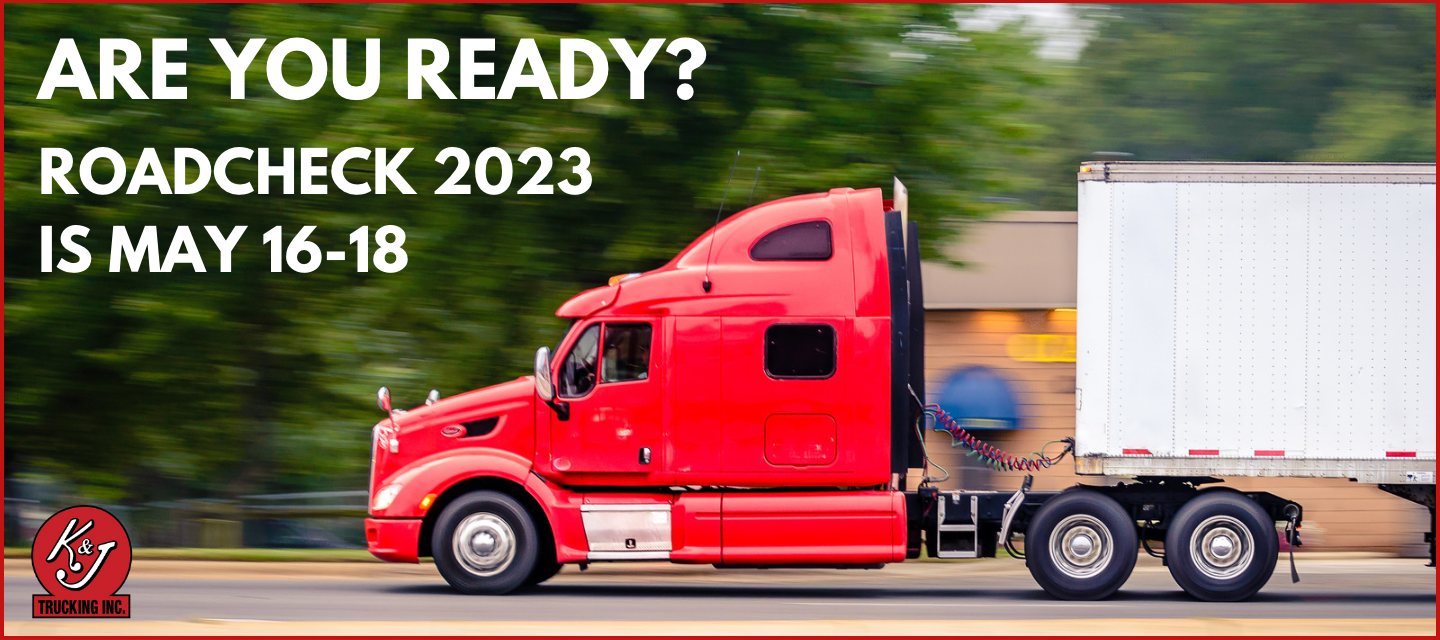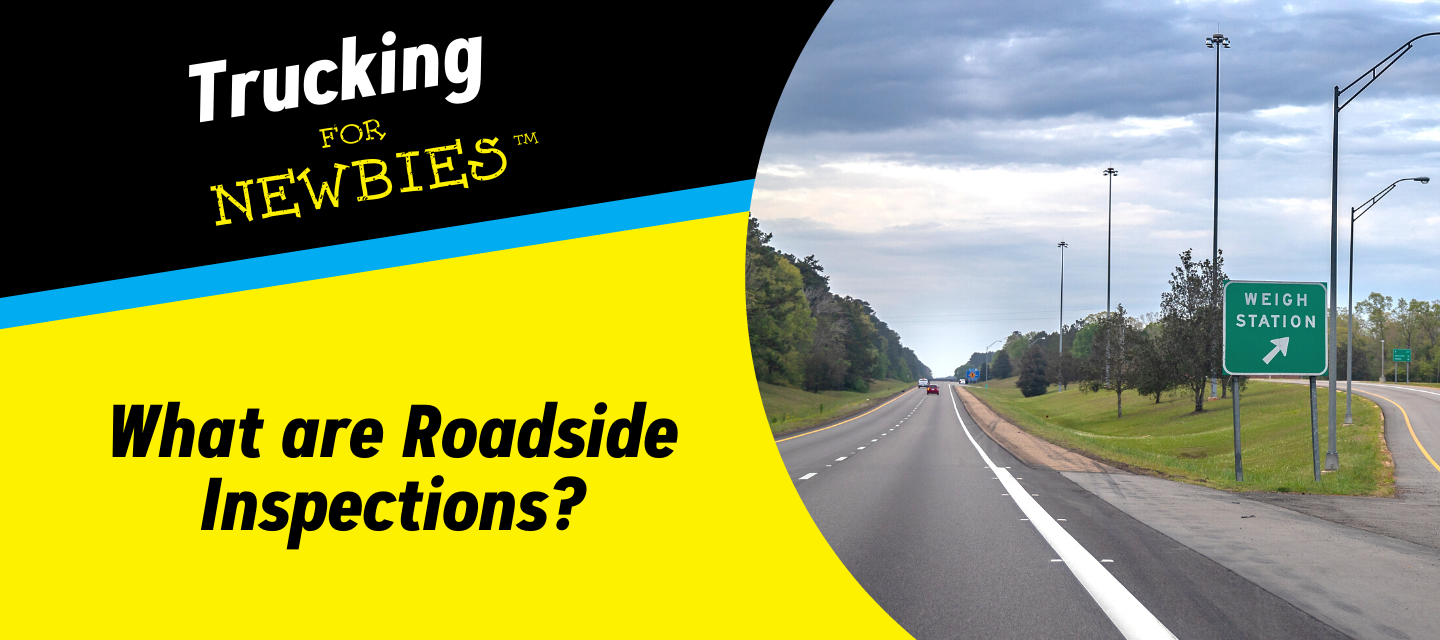Are You Ready? Roadcheck 2023 Is May 16-18

Time to triple check your brakes and cargo! The Commercial Vehicle Safety Alliance (CVSA) has selected May 16-18, 2023 as the dates for International Roadcheck. This year, the focus will be on anti-lock braking systems (ABS) and cargo securement.
If you aren't familiar with Roadcheck, it is a time where inspectors from the US, Canada, and Mexico conduct extra inspections on Commercial Motor Vehicles (CMVs). The goal of the program is to keep unsafe CMVs and drivers off our roadways.
Why abs systems?
“Although ABS violations are not out-of-service violations, ABS play a critical role in reducing the risk of collisions by preventing the wheels from locking up or skidding, allowing a driver to maintain control of the vehicle while braking,” CVSA said.
Why cargo securement?
During last year’s Roadcheck, improper cargo securement accounted for 10.6% of all out-of-service violations. And this isn’t a new issue; past Roadchecks have shown cargo securement violations routinely as a top five offender.
The CVSA explains, “Improper cargo securement poses a serious risk to drivers and other motorists by adversely affecting the vehicle’s maneuverability, or worse, causing unsecured loads to fall, resulting in traffic hazards and vehicle collisions.”
how to prepare for Roadcheck
Do your pre- and post-trip inspections! This the best way to help you identify and avoid any violations before you are flagged for Roadcheck. These inspections will help reduce general violations including lights going out, chafing air lines, and low tire air pressure.
Given this year’s focus, drivers should pay special attention to ABS lamps that don’t illuminate during the diagnostic check, or lamps that stay illuminated while driving. In addition, drivers should verify that all cargo is safely secured before heading out on the road, as well as inspecting tie-downs both before and during their trips.
You should also double check that you have the correct paperwork, either physical or electronic copies, and that it’s easily accessible during an inspection. If you notice something is missing now you have time to get it replaced.
Important paperwork includes:
- truck and trailer registration
- fuel permits
- insurance cards
- annual inspection stickers for both truck and trailer
- instructions for the ELD
As always, obey the laws! Wear your seat belt, don’t speed, fully stop at lights and stop signs, and use the left lane for passing. Maintain a safe following distance, get enough sleep, and never drive under the influence. If you have a restriction, make sure you have the appropriate supplies. If you wear glasses, make sure you have them on. If you use hearing aids, make sure you have spare batteries. Focus on your driving and minimize distractions. Stay off your cell phone!
Keep a safety mindset and don’t get too comfortable - it can be easy to overlook things when you do.
And did we mention, stay off your cell phone?!

how do I know if I have been selected?
CVSA-certified inspectors in Canada, Mexico and the U.S. will be conducting inspections at weigh/inspection stations, designated inspection areas, and along roadways.
If you have a PrePass system (or other weigh station bypass device) in your truck and you are coming up on a scale, follow the red or green light as you normally would. But beware, not all checkpoints are set up at scales.
Pay extra attention when you come up on a mobile checkpoint. While some of them may be set up to use PrePass, many will not. Follow the direction of signs in the area and be courteous of other drivers.
Whatever you do, don't avoid these inspections! There are hefty fines associated with trying to avoid or bypass inspection checkpoints.
What will happen during an inspection?
Inspectors will typically conduct the Level One Inspection and will focus on two areas: driver and vehicle safety compliance. This 37-step general inspection includes a wholesale examination of driver operating requirements and vehicle mechanical fitness. These inspections will be most likely performed at weigh stations. If you pass a Level One inspection, you receive a CVSA sticker that exempts you from another Level One inspection for three months.
During a Level One inspection, you can expect an inspector to look at:
- brake systems
- cargo securement
- coupling devices
- driveline/driveshaft components
- driver’s seat
- fuel and exhaust systems
- frames, lighting devices
- steering mechanisms
- suspensions
- tires, wheels, rims, and hubs
- windshield wipers
Inspectors will also check the driver’s operating credentials, hours-of-service documentation, seat belt usage, and status in the Drug and Alcohol Clearinghouse. They will also be monitoring drivers for alcohol and/or drug impairment.
This year, inspectors will be paying extra attention to ensure that:
- ABS lamp cycles on and off during a diagnostic check
- ABS malfunction indicators, such as lamps remaining on during transit, aren't present
- spare tires, loads, cargo, and dunnage are properly secured, i.e. that the items won’t fall, blow, spill, leak, roll, or shift during transit
- tie-downs are sufficient for the weight and length of items transported
- securement devices are free of defects such as loose, torn, damaged, bent, or knotted tie-downs
- anchor points and structures aren’t damaged
- commodity-specific cargo meets all securement regulations
If a critical vehicle inspection item violation is identified, the vehicle will be not be able to operate until the issues have been corrected. Drivers may also be restricted from operating if they have any out-of-service violations.
Additional information on CVSA inspections and their requirements can be found here.
how to act during an inspection
Be professional, kind, and courteous. Officers are just regular people wearing uniforms. If you treat them well, it will go much better for you.
If you feel you are being written a ticket unfairly, do not be confrontational. The company you work with can and will appeal the result if necessary. Calmly ask for clarification on any violations so you can explain them to your company's safety personnel correctly and with full understanding.
safety is the goal
The CVSA knows how stressful being OTR can be, and how much pressure drivers are under every day getting cargo from point A to point B. Highways are congested, car drivers can be aggressive, and everyone seems to be in a hurry. As a simple reminder, Roadcheck has compiled a list of safety tips for both drivers and their vehicles to help keep everyone safe.
Roadcheck provides an opportunity to educate both the motor vehicle industry and the general public about the North American Standard Inspection Program and safe CMV operations. The data gathered from those three days will highlight the state of CMV and driver safety and will be shared later this year.
Let’s all work together to ensure the safety of our drivers, our trucks, and everyone who shares our roads.

